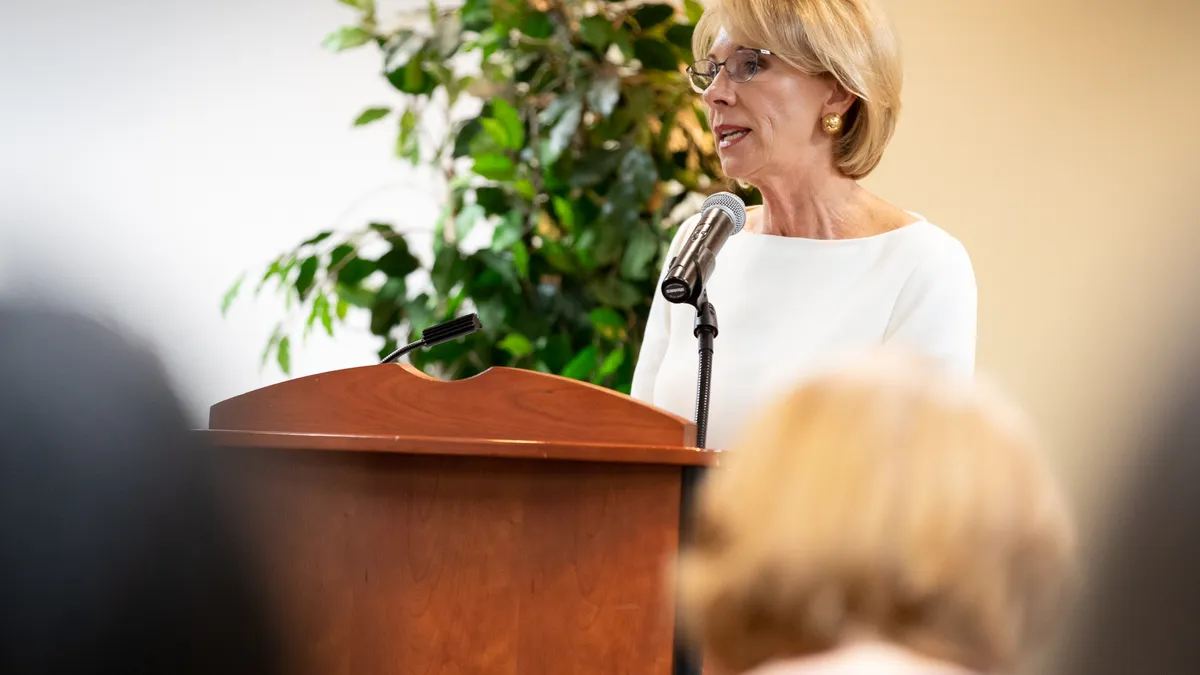Dive Brief:
- Federal judges in Washington, D.C., and New York have declined to block Education Secretary Betsy DeVos' new regulation governing how colleges must investigate and punish campus sexual misconduct.
- The more significant of the two cases is a lawsuit that 18 Democratic attorneys general filed in the D.C. court. They argue the new Title IX rule limits the incidents colleges would need to address, thus undermining the federal sex discrimination law.
- Enforcement of the new rules begins Friday, much to the dismay of sexual assault survivor advocacy groups, as well as many institutions, which criticized the U.S. Department of Education for implementing them during the pandemic.
Dive Insight:
DeVos released the final regulation in May as a replacement for guidance proffered under the Obama administration that survivor advocates credit with firming up protections for victims of sexual violence.
But critics of the previous policy, which DeVos rescinded about three years ago, say it went too far and was unfairly slanted against accused students.
Her new rule creates a courtroom-style structure for handling episodes of sexual misconduct. Both parties in a case must participate in a live hearing, which may be held virtually, and allows for the sides to ask each other questions through a surrogate.
The regulation also narrows the definition of sexual harassment to the version used by the U.S. Supreme Court, and it reduces the number of cases that colleges would need to look into off campus.
The attorneys general sued DeVos over the rule on June 4, seeking to stop it from taking effect. New York filed a separate lawsuit against the regulation that same day.
Federal courts in both cases denied injunctions against the rule within the last week. Brett Sokolow, president of the Association of Title IX Administrators, said though cases challenging the regulation are still pending, the rulings mean that "effectively nothing" will stop it from taking effect.
Carl Nichols — the U.S. District Court judge handling the lawsuit from the attorneys general — declined their request Wednesday, and DeVos issued a statement that day celebrating.
"With yet another failed attempt to block our historic Title IX Rule, we can now look forward to it taking effect this Friday, requiring schools to act in meaningful ways to support survivors of sexual misconduct without sacrificing important safeguards to protect free speech and provide all students with a transparent, reliable process," she said in the statement.
In court filings, Nichols wrote he wasn't convinced the states' top lawyers would succeed in their lawsuit. The attorneys general had said the enforcement date for the rule was "arbitrary," especially considering the pandemic, but Nichols noted, echoing a common department talking point, that states and institutions had ample notice the rule was coming.
Nichols also noted that the department had seemingly taken the time to consider the balance between preserving the rights of survivors and those accused.
"[A]s the Department has repeatedly acknowledged, Plaintiffs are free to investigate and punish as violations of their codes of conduct or of state law behavior that does not meet the new definition of sexual harassment under the Final Rule," Nichols wrote.














